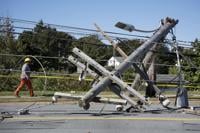HALIFAX - Nearly three weeks after post-tropical storm Fiona blasted through Nova Scotia, the provincial government has proposed legislation requiring telecommunications companies to be better prepared for major weather events.
Amendments to the Emergency Management Act and the Emergency 911 Act tabled Thursday would require phone companies to take all possible precautions to maintain service during a major storm or other emergency. They would also be required to develop an annual emergency response plan and to rebate customers for lost service.
John Lohr, minister responsible for the province’s Emergency Management Office, said the legislation is lawful despite the fact the telecommunications companies are federally regulated.
“With these legislative changes, we are sending a strong message to the federal government that we are no longer willing to stand for the status quo,” Lohr said. “There is federal regulation … but the province is responsible for emergency management and local matters.”
The bill would also require representatives of the companies to be physically present at the province’s emergency response centre during storms.
Failure to comply with the changes could result in daily fines of up to $250,000 if a company is convicted under the legislation.
Lohr said he believes the rebate provision is about fairness to consumers. “If you are a cellphone customer and you are not receiving cellphone service, then the meter shouldn’t be ticking on your bill,” he said.
The proposed bill comes after Premier Tim Houston rebuked telecommunications companies for a lack of transparency about cell service disruptions on Sept. 28 -- four days after Fiona ravaged the province and much of Atlantic Canada.
“We want to send a signal that things have to change," Lohr said.
This report by ������ϲʹ������� was first published Oct. 13, 2022.








































